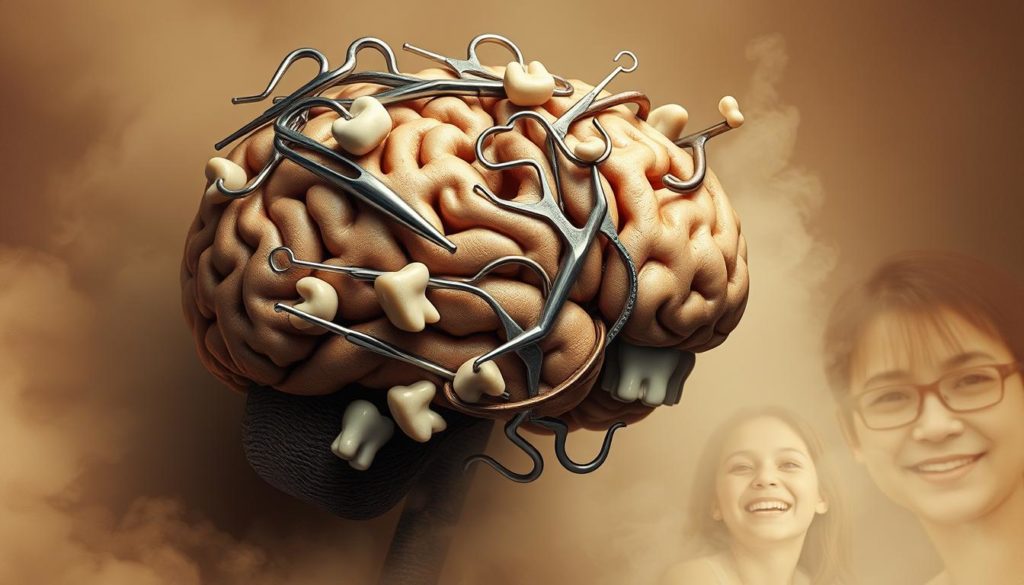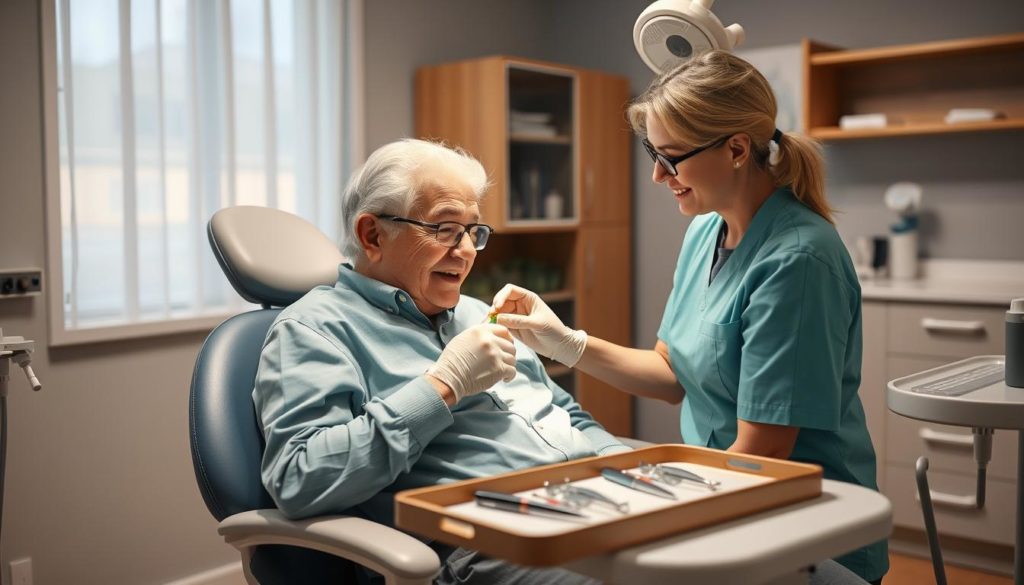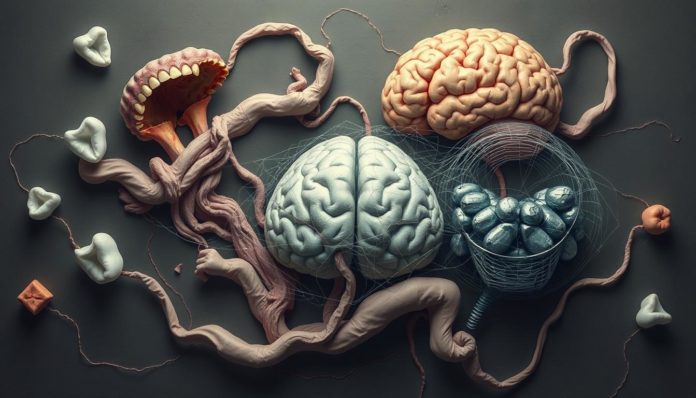Did you know that about 64% of older adults with Alzheimer’s also have severe dental issues? This shocking fact highlights an important link between oral health and dementia. It shows why we must look at dental problems when caring for people with Alzheimer’s.
The relationship between dental health and Alzheimer’s is backed by lots of research. Good oral health could help control Alzheimer’s symptoms. So, it’s key for patients and those looking after them to focus on dental care.
In this article, we’re going to see how oral bacteria can affect the brain. We’ll look at what science says and talk about why good dental hygiene matters for those with Alzheimer’s.
The Connection Between Oral Health and Alzheimer’s Disease
Oral health matters more than you might think, especially when it comes to the brain. It plays a big role in fighting Alzheimer’s disease. Knowing how dental health and Alzheimer’s are connected is key to good care.

Scientific Research and Findings
Many studies have shown a link between Alzheimer’s and oral health. If you don’t take care of your teeth, you could face greater risks of brain issues. Research shows that mouth bacteria can make Alzheimer’s worse.
Experts agree that taking care of your teeth can help with Alzheimer’s. They say keeping your teeth clean could slow down dementia. So, it’s really important to brush and floss regularly.
How Oral Bacteria Affects Brain Health
The link between mouth bacteria and brain health is getting a lot of attention. Bad bacteria from your mouth can travel to your brain. This can cause swelling and make Alzheimer’s symptoms stronger. So, keeping your teeth clean is a big deal.
It’s important for caregivers to know about this link. It can really change how well someone with Alzheimer’s lives. Going to the dentist often and keeping teeth clean can help keep the brain healthy.
Why Dental Care for Alzheimer’s Patients is Crucial
Proper dental care is crucial for Alzheimer’s patients because of their unique challenges. As the disease progresses, keeping up with dental hygiene becomes tough. This can lead to more dental problems in the elderly with Alzheimer’s.

Challenges Faced by Caregivers
Caregivers are key in helping with dental issues in Alzheimer’s patients. They face many hurdles. For example, patients may resist brushing and forget how to do basic dental care. These challenges make keeping up with oral health hard.
- Resistance to care: Alzheimer’s patients may resist dental care due to confusion or agitation.
- Communication barriers: Difficulty in expressing dental pain or discomfort.
- Complexity of care routines: Performing daily dental hygiene tasks becomes increasingly challenging.
Importance of Regular Dental Check-Ups
Regular dental visits are key for elderly Alzheimer’s patients. These check-ups help catch and treat problems early. Dentists can also tailor care plans for Alzheimer’s patients, making sure they get the right dental care all the time.
| Benefits of Regular Check-Ups | Specific Strategies |
|---|---|
| Early identification of problems | Routine exams and x-rays |
| Customized treatment plans | Personalized dental care approaches |
| Maintaining overall health | Proactive management of oral health |
In short, tackling dental issues in Alzheimer’s patients needs a full plan. This includes understanding the challenges caregivers face and ensuring regular dental visits. Focusing on these areas helps improve the oral health and well-being of loved ones.
Common Dental Problems in Elderly with Alzheimer’s
Seniors with Alzheimer’s often face common dental issues in dementia. Medication side effects and challenges in keeping up with dental care contribute to these problems. They frequently experience gum disease, tooth decay, and a higher risk of infections.
Tooth decay is especially common in these elderly patients. Certain medicines they take can reduce saliva, leading to a dry mouth. This dryness encourages harmful bacteria that cause cavities. Gum disease, known as periodontitis, is also a big problem due to poor dental hygiene.
This increased risk of infections links directly to their dental troubles. When oral health gets worse, fighting off infections becomes harder. Catching and treating these issues early is crucial to avoid more serious health problems.
| Common Dental Issues | Contributing Factors | Impact |
|---|---|---|
| Gum Disease | Difficulty maintaining oral hygiene | Swollen, bleeding gums, tooth loss |
| Tooth Decay | Reduced saliva due to medications | Aches, cavities, tooth loss |
| Infections | Weakened immune response | Greater risk of systemic infections |
Identifying common dental issues in dementia is key to better dental hygiene for seniors with Alzheimer’s. Knowing these key challenges allows caregivers and dental experts to make more effective care plans. This helps improve health overall.
Managing Dental Issues in Alzheimer’s Patients
It’s important to ensure good dental care for Alzheimer’s patients. Their overall health benefits from this care. Caregivers are key, facing challenges in daily dental care needs.
Practical Tips for Daily Care
Daily dental care for Alzheimer’s patients requires soft hands and a calm setting. Here are helpful hints:
- Gentle Brushing: A soft-bristled toothbrush should be used to avoid gum damage. Brush gently in circles.
- Mouthwash: Opt for alcohol-free mouthwash to avoid dryness and discomfort.
- Fluoride Toothpaste: Fluoride toothpaste helps strengthen teeth and prevent decay.
- Comforting Environment: Playing calm music or sticking to known routines can relax the patient.
Choosing the Right Dental Products
Choosing the right dental products is critical for Alzheimer’s patients’ oral health. Keep these guidelines in mind:
| Product Type | Recommendations | Benefits |
|---|---|---|
| Toothbrush | Soft-bristled, electric if possible | Gentle on gums, easy to use |
| Toothpaste | Fluoride-containing, mild flavor | Prevents cavities, less irritating |
| Mouthwash | Alcohol-free, antiseptic | Reduces bacteria, prevents dry mouth |
Focusing on daily dental care significantly improves health outcomes for Alzheimer’s patients. It ensures a better quality of life by addressing specific oral health concerns.
Alzheimer’s and Oral Health Connection
Research is making it clear that oral health and Alzheimer’s disease are connected. This link is largely due to inflammation, which both dental issues and Alzheimer’s share.
Role of Inflammation in Both Conditions
Studies show inflammation is key in gum diseases and Alzheimer’s alike. The body fights oral bacteria through its immune response, leading to chronic inflammation. This can affect the brain and might speed up Alzheimer’s disease. Researchers are looking into how good oral health could slow or impact Alzheimer’s development.
Preventive Measures to Take
To lower Alzheimer’s risk, preventive dental care is important. Regular dentist visits, good oral hygiene, and eating healthy help reduce inflammation. It’s crucial for Alzheimer’s patients to also get proper dental care. This helps prevent oral health problems and might also guard against cognitive health issues related to inflammation.
Dental Hygiene for Seniors with Alzheimer’s
It’s vital to keep up with dental hygiene for seniors with Alzheimer’s for their overall health. Dental care strategies can lower the risk of oral health issues common in dementia patients.
Caregivers are key to oral health maintenance in dementia. Here are useful methods to follow:
- Brush their teeth twice daily with a soft-bristled toothbrush.
- Use fluoride toothpaste to make teeth stronger and keep cavities away.
- Help with flossing or watch over it to get rid of food between teeth.
- Give mouthwash with antiseptic to fight off bad bacteria.
Seeing the dentist regularly is key. Dental check-ups catch problems early. Using these dental care strategies keeps the mouth healthy. This helps seniors with Alzheimer’s stay well overall.
Here are the best dental care tools:
| Tool | Benefit | Frequency of Use |
|---|---|---|
| Soft-Bristled Toothbrush | Easy on gums and teeth | Twice Daily |
| Fluoride Toothpaste | Makes teeth strong, stops cavities | Twice Daily |
| Dental Floss | Takes out food stuck between teeth | Once Daily |
| Antiseptic Mouthwash | Cuts down on bad bacteria | As suggested by a dentist |
Preventing Dental Complications in Alzheimer’s Patients
Maintaining oral health in Alzheimer’s patients is key. It means watching their diet and keeping up with oral hygiene. Doing these well can really cut down on dental problems.
Diet and Nutrition
What Alzheimer’s patients eat matters a lot for their oral health. Foods that are high in calcium, vitamins, and minerals help keep teeth and gums strong. Cutting down on sugary snacks and drinks is essential to avoid tooth decay and gum issues. Eating crunchy fruits and vegetables, like apples and carrots, helps clean teeth naturally.
“The link between diet and oral health in Alzheimer’s cannot be overstated. Nutrition plays a pivotal role in maintaining dental health.”
Staying hydrated is also critical, since a dry mouth can make dental problems worse. Water is the best choice to keep the mouth moist and help wash away food bits that can cause plaque.
Effective Oral Hygiene Practices
It’s crucial to have good dental care routines for Alzheimer’s patients. Brushing gently with a soft-bristled toothbrush twice a day and flossing once a day removes plaque and leftover food. Using fluoride toothpaste helps protect against cavities by strengthening tooth enamel.
- Use an electric toothbrush to make brushing easier and more effective.
- Incorporate mouthwash into the routine to kill bacteria and freshen breath.
- Regularly check for signs of dental problems like bleeding gums or tooth discoloration.
Getting dental check-ups regularly is important to catch and treat any problems early. This helps avoid serious dental issues and makes life better for Alzheimer’s patients.
Recognizing Alzheimer’s Oral Health Concerns
Caring for someone with Alzheimer’s is hard, especially their oral health care. Spotting key signs early helps get the right dental care sooner.
Signs to Look Out For
Noticing Alzheimer’s oral health signs early can make a big difference. Look for these symptoms:
- Frequent complaints of mouth pain or discomfort
- Noticeable bad breath even after brushing
- Visible changes in gum color, such as increased redness or swelling
- Difficulty chewing or swallowing food
- Unusual amounts of plaque or tartar buildup
When to Seek Professional Help
Seeing any mentioned signs means it’s time to get dental help. A dentist can create a care plan to keep their mouth healthy. It’s important to act fast if you see:
- Persistent oral pain or bleeding that doesn’t resolve
- Broken or loose teeth impacting daily activities
- Chewing food becomes extremely painful or difficult
- Severe bad breath that persists despite regular dental hygiene
- Visible signs of infection such as pus or unusual discharge
Getting dental care early for Alzheimer’s patients helps avoid more issues. It makes their life better despite their condition.
Impact of Neglected Oral Health on Alzheimer’s Progression
Poor dental health can speed up Alzheimer’s. This condition worsens as oral health drops. Bad gums and rotten teeth send harmful bacteria into the blood. This causes inflammation that might make Alzheimer’s worse.
Bad teeth do more than damage the mouth; they can start health problems for those with Alzheimer’s. Infected gums or teeth can weaken the body’s defenses. This makes it easier to get sick. Such problems add to the mental decline seen in Alzheimer’s, showing how vital good oral care is.
Inflammation from dental issues harms the brain too. Studies show that such inflammation can push Alzheimer’s to get worse. Keeping teeth healthy could slow down mental loss. Managing dental health for Alzheimer’s means better life quality for the sick.
FAQ
How are dental problems and Alzheimer’s disease linked?
Poor oral health can make Alzheimer’s patients’ issues worse. Dental problems can lead to brain health issues and speed up Alzheimer’s disease progression.
What do scientific studies say about the connection between oral health and Alzheimer’s?
Studies show a link between oral bacteria and brain health. These bacteria can reach the brain through the bloodstream. They contribute to inflammation and plaque, which are linked to Alzheimer’s.
Why is dental care crucial for Alzheimer’s patients?
Good oral health prevents pain and infections in Alzheimer’s patients. Regular dental visits help them manage their condition. It leads to better quality of life.
What are common dental issues observed in seniors with Alzheimer’s?
Those with Alzheimer’s often suffer from gum disease, tooth decay, and dry mouth. Their medication can make these problems worse.
What practical tips can caregivers use for daily dental care in Alzheimer’s patients?
Caregivers should brush gently and choose gentle dental products. Using electric toothbrushes and fluoride toothpaste is beneficial. Creating a calm environment for dental care is also key.
What role does inflammation play in both dental health and Alzheimer’s?
Inflammation affects both dental health and Alzheimer’s. Gum inflammation can raise body inflammation, impacting the brain. This might speed up Alzheimer’s.
How can dental complications in Alzheimer’s patients be prevented?
Preventing dental issues involves a healthy diet, regular dental visits, and good oral hygiene. Cut down on sugary foods and drinks.
What are the warning signs of poor oral health in Alzheimer’s patients?
Warning signs include bad breath, bleeding gums, eating difficulties, and tooth decay. Seek dental care if these symptoms appear.
How does neglected oral health impact the progression of Alzheimer’s?
Neglected oral health leads to infections and inflammation. This can worsen Alzheimer’s cognitive decline. Poor dental care affects their overall health and speeds up the disease.


